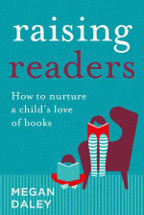Raising Readers by Megan Daley

UQP, 2019. ISBN: 9780702262579.
(Age: Adult) Recommended. This is unashamedly a book about books,
the subtitle How to nurture a child's love of books clearly
places the author among those for whom books are a passion they want
everyone to share. However, instead of a lot of 'motherhood'
statements the first part is full of well researched information
about the mechanics of reading organised along developmental stages
with multiple strategies for enhancing learning and dealing with
issues as they are encountered. The difference between educational
readers and recreational reading is explained, stimulating different
kinds of learning in the child, one without the other will leave
gaps. Equally the importance of comprehension along with word
recognition is explored. Asserting the need for multiple strategies
for children learning to read, the author has included are many
first-hand accounts from experts and 'literary friends'.
Particularly valuable are the book recommendations which
refreshingly feature Australian books. Parents and educators need to
offer children a balanced literary diet but can unconsciously do a
disservice by selecting books with a gender bias. Marketing is often
quite gender specific and in one of the very interesting
contributions author Jacqueline Harvey talks about the frustrations
of adults making decisions that her books are not for boys. The
second part of the book looks at the features of different genres,
as a fan of graphic novels I was pleased to see them discussed and
valued. The chapter on multimodal and digital reading suggests the
decoding skills necessary for reading can be transferred
successfully into computational thinking, 'thinking logically,
decomposing into smaller parts, looking for and recognising
patterns, abstracting ideas, designing algorithms and making
judgements' p. 150. Computer coding is a language and learning it can
enable children 'not just to use digital technologies, but to read,
comprehend and create them p. 151. Making and creating are integral
parts of a reading strategy, from making book week costumes to
library makerspaces and the research skills acquired, the link
between enjoying stories and creating responses to them whether it
be written, oral or visual are not forgotten. Some of the more
subtle aspects of reading; mindfulness, sustainability and diversity
are discussed and there are some useful 'How to' guides at the end
of the book. Comprehensive end notes and contributor biographies
make this a surprisingly concise, readable, useful and inspiring
addition to any parent or teacher's library.
Sue Speck